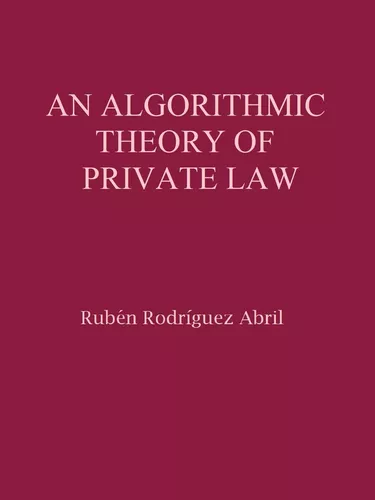Skip to the end of the images gallery Alternar Nav
Skip to the beginning of the images gallery Alternar Nav

Mejor vendido
An algorithmic theory of Private Law
Possible applications of the Fourth Industrial Revolution to the legal field
ePUB
20,8 MB
DRM: Marca de agua
ISBN-13: 9788413737478
Editorial: Books on Demand
Fecha de publicación: 24.06.2022
Idioma: Inglés
Accesibilidad: Accesibilidad limitada
1,99 €
IVA incl.
ya disponible para descarga
The purpose of this paper is to explore the possible applications of Automata Theory and the technologies of the Fourth Industrial Revolution (particularly blockchain) to the field of Private Law, and particularly to the documentation of the rights and duties of individuals.
Throughout its sections, a systematic definition of the digital asset is provided, and parallels and analogies are drawn between the algorithms that regulate the transmission of digital rights and legal rules. The existence of algorithms of a truly normative nature is explored. Some of these normative algorithms are limited to developing legislation of the corresponding State, while others, such as those residing in blockchains, configure a legal structure independent of any State authority that the author comes to call "algorithmic legal system".
The book proposes, in its second half, the use of these normative algorithms to incorporate into cyberspace the transactions of real estate rights and the phenomenon of the legal person. In addition, proofs of concept are offered for a new Land Registry and a new Registry of Legal Entities with fully automatic operation.
Throughout its sections, a systematic definition of the digital asset is provided, and parallels and analogies are drawn between the algorithms that regulate the transmission of digital rights and legal rules. The existence of algorithms of a truly normative nature is explored. Some of these normative algorithms are limited to developing legislation of the corresponding State, while others, such as those residing in blockchains, configure a legal structure independent of any State authority that the author comes to call "algorithmic legal system".
The book proposes, in its second half, the use of these normative algorithms to incorporate into cyberspace the transactions of real estate rights and the phenomenon of the legal person. In addition, proofs of concept are offered for a new Land Registry and a new Registry of Legal Entities with fully automatic operation.
Escriba su propia opinión






De momento no hay recortes de prensa sobre este título.